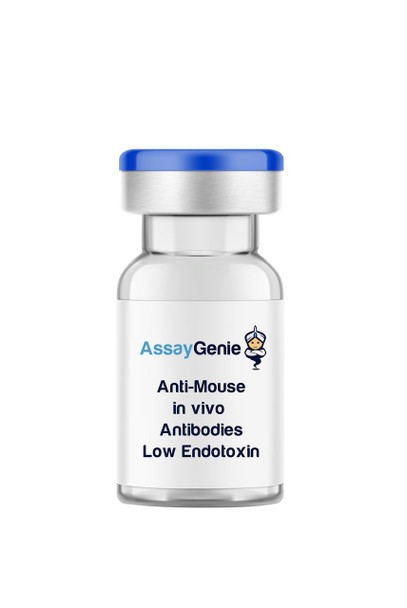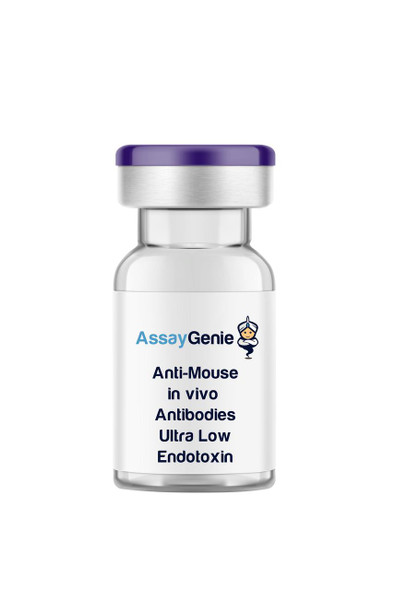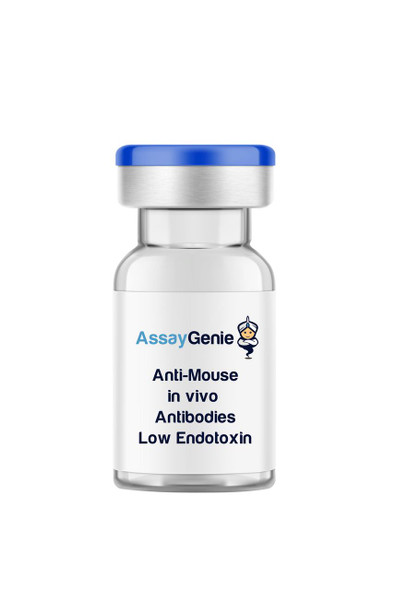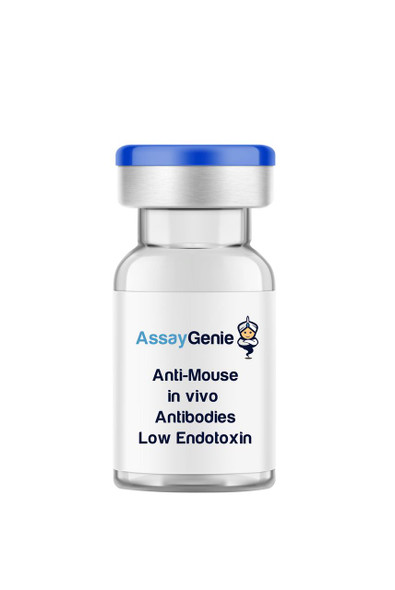Anti-Mouse CD70 [FR70] In Vivo Antibody - Low Endotoxin (IVMB0320)
- SKU:
- IVMB0320
- Antibody Type:
- Functional-Grade In Vivo Antibody
- Disease Area:
- Cancer
- Clone:
- FR70
- Protein:
- CD70
- Isotype:
- IgG2b k
- Reactivity:
- Mouse
- Synonyms:
- TNFSF7
- KI-24 antigen
- CD27 Ligand
- CD27L
- Research Area:
- Costimulatory Molecules
- Immunology
- Endotoxin Level:
- Low Endotoxin
- Host Species:
- Rat
- Applications:
- FA
- FC
- In Vivo
- WB
Description
| Product Name: | Anti-Mouse CD70 (Clone FR70) In Vivo Antibody - Low Endotoxin |
| Product Code: | IVMB0320 |
| Size: | 1 mg, 5 mg, 25 mg, 50 mg, 100 mg |
| Clone: | FR70 |
| Protein: | CD70 |
| Product Type: | Monoclonal Antibody |
| Synonyms: | TNFSF7, KI-24 antigen, CD27 Ligand, CD27L |
| Isotype: | IgG2b k |
| Reactivity: | Mouse |
| Applications: | FA, FC, In Vivo, WB |
| Formulation: | This monoclonal antibody is aseptically packaged and formulated in 0.01 M phosphate buffered saline (150 mM NaCl) PBS pH 7.2 - 7.4 with no carrier protein, potassium, calcium or preservatives added. Due to inherent biochemical properties of antibodies, certain products may be prone to precipitation over time. Precipitation may be removed by aseptic centrifugation and/or filtration. |
| Endotoxin Level: | < 1.0 EU/mg as determined by the LAL method |
| Purity: | ≥95% monomer by analytical SEC ⋅ >95% by SDS Page |
| Product Preparation: | Functional grade preclinical antibodies are manufactured in an animal free facility using in vitro cell culture techniques and are purified by a multi-step process including the use of protein A or G to assure extremely low levels of endotoxins, leachable protein A or aggregates. |
| Applications: | FA, FC, In Vivo, WB |
| Reactivity: | Mouse |
| Host Species: | Rat |
| Specificity: | FR70 activity is directed against mouse CD70. |
| Antigen Distribution: | Mouse CD70 is transiently expressed on the surfaces of antigen-activated B and T cells, natural killer cells, and mature dendritic cells. CD70 is also aberrantly expressed on malignant cancer cells. |
| Immunogen: | BALB/c mouse B lymphoma A20.J2 |
| Concentration: | ≥ 5.0 mg/ml |
| Endotoxin Level: | < 1.0 EU/mg as determined by the LAL method |
| Formulation: | This monoclonal antibody is aseptically packaged and formulated in 0.01 M phosphate buffered saline (150 mM NaCl) PBS pH 7.2 - 7.4 with no carrier protein, potassium, calcium or preservatives added. Due to inherent biochemical properties of antibodies, certain products may be prone to precipitation over time. Precipitation may be removed by aseptic centrifugation and/or filtration. |
| Purity: | ≥95% monomer by analytical SEC ⋅ >95% by SDS Page |
| Preparation: | Functional grade preclinical antibodies are manufactured in an animal free facility using in vitro cell culture techniques and are purified by a multi-step process including the use of protein A or G to assure extremely low levels of endotoxins, leachable protein A or aggregates. |
| Storage and Handling: | Functional grade preclinical antibodies may be stored sterile as received at 2-8°C for up to one month. For longer term storage, aseptically aliquot in working volumes without diluting and store at -80°C. Avoid Repeated Freeze Thaw Cycles. |






